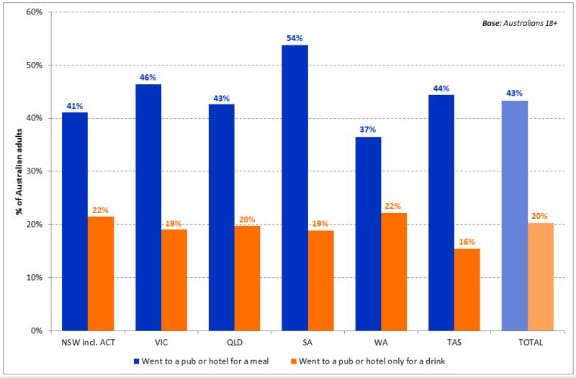The results of the study by researchers at Deakin University and the Australian National University suggest that older Australians with unhealthy diets have smaller hippocampi, while those with healthier diets have larger hippocampi.
Deakin’s Felice Jacka, the study’s lead author, said evidence linking poor diet to brain health is growing.
“It is becoming even clearer that diet is critically important to mental as well as physical health throughout life,” Associate Professor Jacka said.
“We’ve known for some time that components of diet, both healthy and unhealthy, have a rapid impact on aspects of the brain that affect hippocampal size and function, but up until now these studies have only been done in rats and mice.

“This is the first study to show that this also appears to be the case for humans.”
The researchers used magnetic resonance imaging to measure the size of left and right hippocampi in Australian adults aged 60-64 years while taking into account other factors that might affect the hippocampus.
The results, published in BMC Medicine, suggest that older adults who consume more unhealthy products like sweet drinks, salty snacks and processed meats, have smaller left hippocampi.
Conversely, that part of the brain was bigger in those with more nutrient-rich diets, including vegetables, fruits and fish.
Such relationships existed over and above other factors that may explain these associations, such as gender, levels of physical activity, smoking, education or depression itself, the researchers found.
These findings have relevance for both dementia and mental health, Associate Professor Jacka said, as until now it has not been clear how diet might exert an influence on mental health and cognition.
Pub culture is now more about eating than drinking
More Australians visit the pub for a meal than they do for just a drink, according to the latest findings from Roy Morgan Research.

Over four in 10 of the population, equating to just under 8m Australians, have visited the pub for meal in the last three months, the market researcher found. This was more than double the 3.7m people, or 20%, who went to their local just to drink.
While a quarter of men, compared to 15% of women visit the pub to drink, pub dining is more gender-balanced, attracting similar proportions of men (44%) and women (42%).
Overall, people who live in the country (45%) are a little more likely than those in state capitals (42%) to dine at a pub.
South Australians are particularly fond of pub grub, with more than half of them (54%) eating a meal at the pub in an average three months—well ahead of Victorians (47%).
Western Australians are less inclined to dine at the pub (36%) while NSW residents are marginally ahead of other states when it comes to pub-drinking (21%).
Going to the pub for just a drink is most popular among younger Australians aged 18-24 (27%) and 25-34 (28%), dropping off sharply among those aged over 50.
On the other hand, the 50-64 age bracket is more likely than any other group to grab a pub meal (45%), but only marginally. In an average three months, 44% of 25-34 year-olds and the same proportion of 35-49 year olds also eat out at a pub or hotel.
“Our latest findings suggest that Slim Dusty’s mythical ‘Pub with no Beer’ might stand a chance in this day and age, as long as its meals were up to scratch,” said Andrew Price of Roy Morgan Research.
“A far greater number of Australians are visiting pubs and hotels to dine rather than for the sole purpose of having a tipple, a trend that has been helped along by the proliferation of ‘gastropubs’.
“Aussie pub dining has come a long way since the humble counter meal. By positioning themselves as an affordable and appealing alternative to conventional restaurants, pubs are not only attracting patrons who might not otherwise have visited, they are also adapting to the national decline in alcohol consumption.”
Of course, just because someone visits a pub for a meal rather than just to drink doesn’t mean they won’t imbibe with their meal. Adults who dine at pubs are more than 20% more likely than the average Australian to agree that “I like to drink wine with my meals”, the research suggests.
TGA approves 10 ingredients for use as complementary medicines
Australia’s natural supplements regulator, the Therapeutic Goods Administration (TGA) has pleased the industry no end by approving 10 ingredients that it has assessed as suitable for use in listed medicines.

Carl Gibson, chief executive of Complementary Medicines Australia (CMA), which represents the natural healthcare industry, has been a vocal advocate for the removal of redundant regulatory burden.
He said: “We welcome this streamlining of ingredient approvals, resulting from recent work by the TGA towards greater collaboration with comparable international regulators and with industry.
“It is important to enhance competition and innovation in the industry by removing unnecessary regulation while maintaining consumer confidence in the exceptional reputation of the Australian regulatory system.”
Because of the TGA’s strict framework, many ingredients that are found safe overseas have not been available in Australia, meaning consumers have been missing out on numerous new products.
“The approval of these new ingredients is a good start towards rectifying this situation,” said Gibson.
“The complementary medicines industry is driven by consumers, meaning that the ability to innovate is vital to the sustainability of the complementary medicines industry, enabling companies to produce new products and meet consumer demands.
“With an appropriate regulatory environment, the Australian complementary medicines industry will continue to grow and support high skilled manufacturing and local jobs.”
A government commission that has been charged with exploring productivity and unravelling red tape has estimated that reducing unnecessary regulatory burden could generate as much as A$12bn (US$8.6bn) in extra gross domestic product per year.
Fsanz calls for opinions on high-yield GM corn strain
The antipodean food regulator has called for public opinions on an application to permit a genetically modified corn line after assessing it posed no health issues to the public.

Steve McCutcheon, chief executive of Food Standards Australia New Zealand (Fsanz), said the crop had been modified to producer a higher yield with larger kernels at an early reproductive stage.
“Fsanz conducted a thorough safety assessment on the application, which included comparing the GM corn with a non-GM corn from a molecular, toxicological and nutritional point of view,” Mr McCutcheon said.
“The aim of the assessment is to find out if there are any differences between the GM food and its conventional counterpart. No public health or safety issues were identified and the corn was found to be as safe as its conventional counterpart.”
Fsanz has invited submissions from government agencies, public health professionals, the food industry and the community.
All standards decisions by Fsanz are notified to ministers responsible for food regulation. The ministers can then decide to adopt, amend or reject standards, or they can ask for a review.
The period for comment closes on 28 October 2015.
